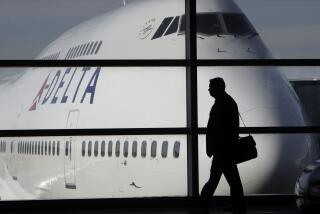U.S. Drops Ticketmaster Antitrust Probe : Entertainment: Abrupt closure of investigation lifts cloud of uncertainty over firm, catches others in industry off guard.
- Share via
The Justice Department on Wednesday ended its antitrust probe of Los Angeles-based Ticketmaster, closing the book on an investigation that once threatened to dramatically alter business practices in the nation’s $1-billion concert industry.
The yearlong investigation was prompted by complaints from the Seattle rock group Pearl Jam, which alleged in a May, 1994, memorandum to the Justice Department that Ticketmaster exercised a monopoly over ticket distribution and used its market power to gouge consumers with excessive service fees.
The department’s abrupt decision to end the investigation--announced in a two-sentence news release late Wednesday--came just after Pearl Jam’s effort to organize a tour without the ticket giant collapsed in acrimony. Although the band said recent concert cancellations were further evidence of Ticketmaster’s monopoly, the company said Pearl Jam’s troubles were of its own making.
For Ticketmaster, the Justice Department’s decision to end the investigation lifts a huge cloud of uncertainty that had threatened the company’s ambitious plans to launch new electronic services and establish itself as a broad-based entertainment company.
“Ticketmaster is pleased that after an intense, yearlong investigation that the Justice Department has concurred we are conducting business within the bounds of the antitrust laws,” Ticketmaster spokesman Larry Solters said. “Its investigation . . . demonstrates that these claims had no merit.”
The announcement of the probe’s closure caught Ticketmaster and others in the ticket business off guard--particularly one ticket company financier who was scheduled to be interviewed today by investigators in Washington.
“I’m astonished,” said Ray Garman, a Philadelphia shareholder in ETM, the Orange County firm that sold tickets to Pearl Jam’s defunct alternative summer tour. “The Justice Department just called me and canceled my interview only minutes before they released the news to the media. Go figure.”
Pearl Jam representatives could not be reached for comment.
Over the past year, the Justice Department has conducted numerous interviews with talent managers, promoters, venue owners and ticket software firms. In recent months, investigators continued to subpoena documents from various individuals that were considered pertinent to the case.
The investigation centered on Ticketmaster’s practice of paying a portion of the service fee it collects to the owners of major venues and promotion firms in exchange for exclusive contracts to ticket all events at that venue.
Justice Department officials would not elaborate on the sparse announcement that the investigation was being dropped without action.
But sources close to the case said economic analysts in the antitrust division believed it would be difficult to bring a case against Ticketmaster, primarily because venue owners and promoters willingly signed the exclusivity contracts.
Indeed, the department met in March with attorneys representing a coalition of Ticketmaster clients who contended that because the arrangements were entered into freely by venue owners, it would be an infringement on their rights to challenge such agreements.
This is the second time Ticketmaster’s practices have been reviewed and approved of by the Justice Department.
The company’s domination of the ticketing business became an issue in 1990 when it proposed to buy the remaining assets of Ticketron, essentially putting its largest competitor out of business.
Because of the size of the transaction, both companies were required to file notice with the federal government under the Hart-Scott-Rodino Act to seek antitrust exemption. Despite objections raised by several consumer groups, the Justice Department in 1991 declined to oppose the acquisition.
The debate over tickets has been heating up for years as fans complain about increasing prices charged by artists, venue owners, promoters and ticket service companies.
The debate triggered hearings last fall on Capitol Hill that prompted the introduction of legislation in the House of Representatives that would require a Federal Trade Commission study of the ticket distribution business and mandate disclosure of service charges in concert advertising.
A handful of lawmakers have called for similar state measures, with at least one that includes a provision seeking to place a 15% cap on service charges.
The New York attorney general’s office has reportedly been investigating the company’s practices. Ticketmaster also faces several private antitrust lawsuits, including one filed in March by MovieFone Inc.
More to Read
The biggest entertainment stories
Get our big stories about Hollywood, film, television, music, arts, culture and more right in your inbox as soon as they publish.
You may occasionally receive promotional content from the Los Angeles Times.









